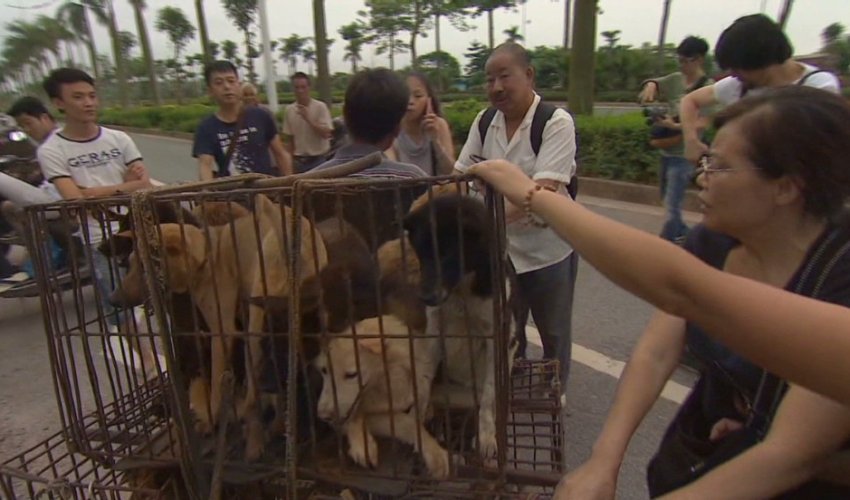Friend or food? Dog meat trade divides China

Yulin's dog meat "festival," where some 10,000 dogs are slaughtered and served up as meals, is often wrongly assumed to be an ancient Chinese tradition.
In fact, the festival only dates back to 2009 when it was launched in the city in China's southwest to celebrate the summer solstice.
The consumption of dog meat does have historical precedence in China.
At its height during the Han Dynasty (202 - 220 AD), dog meat was considered a delicacy.
Yet, dog eating soon lost favor and by the Sui-Tang dynasties (581 -- 907 AD), dog eating had been rejected as an indecent habit.
Subsequent dynasties valued dogs as helpers and hunting buddies.
In the 21st century, dog eating is facing strong criticism inside China. Three decades of economic expansion has spawned a growing army of animal lovers and pet owners believed to be 30 million strong.
Of China's estimated 130 million dogs, at least 27 million are urban pets, according to research group Euromonitor.
As more young people move into the cities, they look to companion animals for comfort in the absence of the family unit.
With their new found bond with animals, this new generation of Chinese see cats and dogs as thinking, feeling individuals deserving of compassion. Most importantly, they are friends not food.
I believe the dog meat industry is fighting a losing battle.
My own investigations and those of Chinese activists and journalists all confirm its downward spiral as the cruelty involved is exposed.
Guangzhou, a city well known for eating dogs, cats and exotic wildlife, just closed a dog meat restaurant that had been in operation for 51 years, according to local reports.
Likewise, brutal dog slaughter used to be everywhere in Beijing's suburbs less than 10 years ago, but it has now virtually disappeared.
In 2011, local authorities shut down the Jinghua Dog Meat Festival following nationwide condemnation.
How long can Yulin authorities remain defiant of Chinese and international public opinion?
Rabies risk
The dog meat trade is a serious threat to human health, and Chinese authorities have every reason to stand by the animal advocates.
China has the world's second highest incidence of rabies in humans. And according to China's ministry for public health, Guangxi province, where Yulin is located, has the largest number of cases in China, while Yulin is one of China's "top ten cities" for cases of human rabies.
Eating dog meat of itself does not cause rabies, but the handling and slaughter of vast numbers of unvaccinated dogs exposes the traders to a high risk of rabies infection.
Transporting the dogs to the festival is an intrinsically brutal operation. Dogs for Yulin come from as far as central and north China's Henan and Shandong, more than 1,000 miles away.
They are crammed into wire cages unable to extend their limbs, denied food and water for days during the exhausting trip. The dogs arrive at their destination malnourished and underweight, dehydrated, often dying from injuries or from being poisoned during capture. Others are already dead.
Food safety disaster
This isn't solely an animal welfare issue; it's also a food safety disaster.
China's food safety regulations ban the processing, selling and serving of products from diseased or dead animals of unknown causes.
And yet the Yulin authorities seemingly ignore these rules, allowing dog meat from unknown sources to be sold to consumers, and in so doing prioritizing the profits of dog meat traders over consumer health.
When contacted by CNN, a spokesperson for the local food and drug administration declined to answer any questions.
The average Chinese citizen finds public dog slaughter inexcusably offensive.
Dogs are openly killed in crowded marketplaces, on the streets, and most shockingly next to elementary schools, imposing bloody and cruel practices on vulnerable members of the public.
Such public slaughter risks creating an indifferent and morally defunct society.
Beating and killing these struggling, crying dogs in full view of other terrified dogs showcases an industry that is devoid of humanity.
Additionally, the criminal activity of dog theft sustains much of the dog meat industry, with often violent confrontations between angry dog owners and the thieves.
www.ann.az
Similar news
Similar news
Latest news 
More news 



































 Photo
Photo 



 Video
Video 

